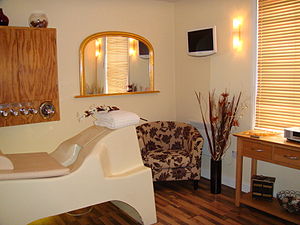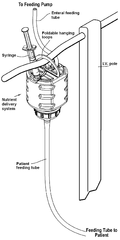- Colon cleansing
-
This article is about the alternative medicine technique. For the process to clean the colon before medical imaging, see Enema.
Colon cleansing (also known as colon therapy) encompasses a number of alternative medical therapies intended to remove feces and nonspecific toxins from the colon and intestinal tract. Colon cleansing may take the form of colon hydrotherapy (also called a colonic or colonic irrigation) or oral cleansing regimens such as dietary supplements. During the 2000s internet marketing and infomercials of colon supplements increased.[1]
Some forms of colon hydrotherapy use tubes to inject water, sometimes mixed with herbs or with other liquids, into the colon via the rectum using special equipment. Oral cleaning regimes use dietary fiber, herbs, dietary supplements, or laxatives. People who practice colon cleansing believe that accumulations of putrefied feces line the walls of the large intestine and that these accumulations harbor parasites or pathogenic gut flora, causing nonspecific symptoms and general ill-health. This "auto-intoxication" hypothesis is based on medical beliefs of the Ancient Egyptians and Greeks and was discredited in the early 20th century.[2][3]
No scientific evidence supports the alleged benefits of colon cleansing.[3] The bowel itself is not dirty and barring drugs, disease or mechanical blockage, cleans itself naturally without assistance.[4] Certain enema preparations have been associated with heart attacks and electrolyte imbalances, and improperly prepared or used equipment can cause infection or damage to the bowel. Frequent colon cleansing can lead to dependence on enemas to defecate and some herbs may reduce the effectiveness of prescription drugs.[5]
Contents
History
A murphy drip, which could be used as a delivery device
The rationale for colon cleansing is the concept of "auto-intoxication", the idea that food enters the intestine and rots.[2][6] The ancient Egyptians believed that toxins formed as a result of decomposition within the intestines, and moved from there into the circulatory system causing fever and the development of pus. The Ancient Greeks adopted and expanded the idea, applying their belief in the four humours. In the 19th century, studies in biochemistry and microbiology seemed to support the autointoxication hypothesis, and mainstream physicians promoted the idea.[7] The idea was promoted most strongly by Ilya Ilyich Mechnikov, who thought that these toxins could shorten the lifespan. Over time, the concept broadened to "auto-intoxication" which supposes that the body cannot fully dispose of its waste products and toxins, which then accumulate in the intestine.[6] In some cases, the concept led to radical surgeries to remove the colon for unrelated symptoms.[8]
Auto-intoxication enjoyed some favor in the medical community from the late nineteenth to the early twentieth century, but was discarded as advances in science failed to support its claims.[6][9][10] A 1919 paper Origin of the so-called auto-intoxication symptom in the Journal of the American Medical Association[11] marked the beginning of the rejection of the auto-intoxication hypothesis by the medical community.[7]
Despite this, "auto-intoxication" persists in the public imagination. The practice of colon cleansing has undergone a resurgence in the alternative medical community, supported by testimonials and anecdotal evidence and promoted by manufacturers of colon cleansing products.[6][9]
Medical imaging
Colon cleansing is done for its own sake, prior to surgery, colonoscopy, or similar procedures. The colon is cleansed of solid matter with a regimen of liquid foods then a day before the procedure a whole bowel irrigation can be performed.
Relationship to medical symptoms
The symptoms that are attributed to auto-intoxication—headache, fatigue, loss of appetite and irritability—are actually caused by mechanical distention within the bowel, such as irritable bowel syndrome, rather than toxins from putrefying food.[2][7][12] The benefits anecdotally attributed to colon cleansing are vague and the claims made by manufacturers and practitioners are based on a flawed understanding of the body.[9][13] There is little evidence of actual benefit to the procedure, and no evidence that it can alleviate the symptoms that are attributed to the theories of colon cleansing.[10] No surgeries, autopsies or other observations of colons have discovered any evidence of compacted feces or other evidence to support the theory of auto-intoxication or the need for colon cleansing.[2][7]
Complications and risks
The human body naturally removes waste material, and colon cleansing is not necessary except preparatory to a colonoscopy.[4][14] Colon cleansing may disrupt the balance between bacteria and natural chemicals in the bowel, and may interfere with the colon's ability to shed dead cells.[15]
Other rare but serious complications include gastrointestinal perforation from improper insertion,[16][17] and amoebic infection from poorly sterilised equipment.[18] Some colon cleansing regimens disrupt fluid and electrolyte balance which may lead to dehydration and salt depletion, whilst repeated or excessive cleansing programs can lead to anemia and malnutrition.[14] Excessive use of enemas has also been associated with cardiac problems such as heart failure,[14] and heart attacks related to electrolyte imbalances when performed as coffee enema.[19] The frequent use of enemas or other colon cleansing tools may lead to dependence and an inability to defecate without assistance or withdrawal symptoms.[2][5]
Herbs that are consumed for colon cleansing and taken as oral preparations may also interfere with drug absorption and effectiveness of prescription drugs.[5]
Supplement effectiveness
Marketplace conducted a consumer trial with 3 women on the effectiveness of two colon supplements versus fiber.[1] The results showed the supplements did not assist in weight loss and provided no additional benefit over a basic fiber supplement.
Regulation
United States
The U.S. Food and Drug Administration (FDA) regulates the production of equipment used in colon hydrotherapy in the USA but does not regulate their use, or the supplements used in oral colon cleansing regimens and manufacturer claims do not require verification or supporting evidence. The contents of the products are also not verified or tested.[15] The FDA has issued several letters warning manufacturers and suppliers of colon hydrotherapy equipment about making false claims of effectiveness, safety issues and quality control violations.[2]
See also
References
- ^ a b "Do you really need to clean your colon?". Marketplace. CBC Television. 2009. http://www.cbc.ca/marketplace/2009/how_not_to_win_500000/busted.html. Retrieved 2010-05-03.
- ^ a b c d e f Barrett, S (2008-03-09). "Gastrointestinal Quackery: Colonics, Laxatives, and More". Quackwatch. http://www.quackwatch.org/01QuackeryRelatedTopics/gastro.html. Retrieved 2008-09-02.
- ^ a b "Colon Therapy". American Cancer Society. 2008-01-11. http://www.cancer.org/docroot/ETO/content/ETO_5_3x_Colon_Therapy.asp. Retrieved 2010-05-04.
- ^ a b Brody, J (2008-07-22). "Health 'Facts' You Only Thought You Knew". The New York Times. http://www.nytimes.com/2008/07/22/health/22brod.html?_r=2&scp=2&sq=colon%20cleansing&st=cse&oref=slogin&oref=slogin. Retrieved 2008-11-08.
- ^ a b c Schneider, K (2003-02-27). "How Clean Should Your Colon Be?". American Council on Science and Health. http://www.acsh.org/factsfears/newsID.194/news_detail.asp. Retrieved 2008-09-02.
- ^ a b c d Chen TS, Chen PS (1989). "Intestinal autointoxication: a medical leitmotif". J. Clin. Gastroenterol. 11 (4): 434–41. doi:10.1097/00004836-198908000-00017. PMID 2668399.
- ^ a b c d Wanjek, C (2006-08-08). "Colon Cleansing: Money Down the Toilet". LiveScience. http://www.livescience.com/health/060808_bad_colon.html. Retrieved 2008-11-10.
- ^ Smith JL (March 1982). "Sir William Arbuthnot-Lane, 1st Baronet, chronic intestinal stasis, and autointoxication". Annals of Internal Medicine 96 (3): 365–9. PMID 7036818.
- ^ a b c Ernst E (June 1997). "Colonic irrigation and the theory of auto-intoxication: a triumph of ignorance over science". Journal of Clinical Gastroenterology 24 (4): 196–8. doi:10.1097/00004836-199706000-00002. PMID 9252839. http://meta.wkhealth.com/pt/pt-core/template-journal/lwwgateway/media/landingpage.htm?issn=0192-0790&volume=24&issue=4&spage=196.
- ^ a b Adams, C. "Does colonic irrigation do you any good?". The Straight Dope. http://www.straightdope.com/columns/read/852/does-colonic-irrigation-do-you-any-good. Retrieved 2008-09-02.
- ^ Alvarez, WC (1919). "Origin of the so-called auto-intoxication symptom". JAMA.
- ^ Donaldson, AN (1922). "Relation of constipation to intestinal intoxication". JAMA 78: 884–888.
- ^ Lindner, L (2008-01-01). "Colon Cleansing: Don't Be Misled By the Claims". Beth Israel Deaconess Medical Center. http://www.thirdage.com/colon-health/colon-cleansing-dont-be-misled-by-the-claims/FoodandNutrition.aspx?ChunkID=13996. Retrieved 2008-10-30.[dead link]
- ^ a b c Picco, M (2007-03-21). "Colon cleansing: Is it helpful or harmful?". The Mayo Clinic. http://www.mayoclinic.com/health/colon-cleansing/AN00065. Retrieved 2008-11-09.
- ^ a b Tennen M (June 2007). "The Dangers of Colon Cleansing". HealthAtoZ.com. Archived from the original on 2008-06-13. http://web.archive.org/web/20080613223754/http://www.healthatoz.com/healthatoz/Atoz/common/standard/transform.jsp?requestURI=/healthatoz/Atoz/dc/caz/canc/colc/alert08162005.jsp. Retrieved 2008-09-01.
- ^ Handley DV, Rieger NA, Rodda DJ (November 2004). "Rectal perforation from colonic irrigation administered by alternative practitioners". Med. J. Aust. 181 (10): 575–6. PMID 15540974. http://www.mja.com.au/public/issues/181_10_151104/letters_151104-3.html.
- ^ Centers for Disease Control (CDC) (March 1981). "Amebiasis associated with colonic irrigation--Colorado". MMWR Morb. Mortal. Wkly. Rep. 30 (9): 101–2. PMID 6789134.
- ^ Istre GR, Kreiss K, Hopkins RS et al. (August 1982). "An outbreak of amebiasis spread by colonic irrigation at a chiropractic clinic". N. Engl. J. Med. 307 (6): 339–42. doi:10.1056/NEJM198208053070603. PMID 6283354.
- ^ Eisele JW, Reay DT (October 1980). "Deaths related to coffee enemas". JAMA 244 (14): 1608–9. doi:10.1001/jama.244.14.1608. PMID 7420666.
Pseudoscience Terminology Examples AIDS denialism • Astrology • Body memory • Bogdanov Affair • Creation Science • Dianetics • Faith healing • Homeopathy • Intelligent design • Japhetic theory • Lunar effect • Lysenkoism • Melanin theory • Moon landing conspiracy theories • Nibiru collision • Parapsychology • Perpetual motion • Ufology
Resources List of topics characterized as pseudoscienceCategories:- Colon (anatomy)
- Alternative detoxification
- Pseudoscience
Wikimedia Foundation. 2010.


